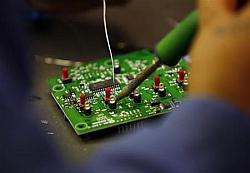Consumer Electronics Post Budget report 2013-14
 Budget Provisions and Impact:
Budget Provisions and Impact:
- To encourage domestic production of set top boxes as well as value addition, the Budget increased the import duty from 5 per cent to 10 per cent.
- About 70 per cent of imported mobile phones and about 60 per cent of domestically manufactured mobile phones are priced at Rs 2000 or below. Budget proposed to raise the excise duty to 6 per cent on mobile phones priced at more than Rs 2000. This will lead to mid and high end mobile phones becoming costlier.
- The Budget also proposed to provide appropriate incentives to semiconductor wafer fab manufacturing facilities, including 0 per cent customs duty for plant and machinery.
- Companies investing Rs. 100 crore or more in plant and machinery during the period 1.4.2013 to 31.3.2015 will be entitled to deduct an investment allowance of 15 per cent of the investment from their taxable income. This will be positive for fresh investments.
- Excise duty of 4 per cent levied on silver manufactured from zinc/lead smelting will be mildly negative for the Precious Metals industry; however most of the increase is expected to be passed on to the consumers.
- Surcharge of 10 per cent imposed on persons whose taxable income exceeds Rs 1 crore per year. This will apply to individuals, HUFs, firms and entities with similar tax status. Mildly Negative for the sector, as spending on luxury goods like diamond jewellery, gold, white goods may be marginally impacted.
- Surcharge at 10 per cent (up from 5 per cent) and 5 per cent (up from 2 per cent) to be levied on domestic and foreign companies’ respectively if the taxable income exceeds Rs 10 crore. This provision will be mildly negative for companies with taxable income more than Rs 10 crore.
- For the electronics industry, the Budget proposed an encouraging move to promote domestic manufacturing of set top boxes by increasing import duty from 5 per cent to 10 per cent and to boost local manufacturing of high tech electronic products in India.
Overall, the budget is positive for the Consumer Durables and Electronics Industry.
Stocks to watch
Videocon, Blue Star, Voltas, Whirlpool, Bajaj Electricals
Industry Pre Budget Wish-list
- Digitalization of TV will create huge demand for Set Top Boxes (STBs) in the country and is likely to touch 20 Million units per annum. Current demand is being met by imports. Industry seeks Customs Duty on Set Top Boxes be increased to 10 per cent (currently 5 per cent) for at least two years, to encourage local manufacturing
- There are no additional benefits for manufacturing Energy Efficient products. Our country is energy deficient. Energy conservation is vital and government should provide incentives for manufacturing energy efficient products, particularly high energy consuming categories such as Air-Conditioner & Refrigerator. Presently 25 per cent of Refrigerators & 10 per cent of Air-Conditioners have 5 Star rating.
- Excise duty relaxation should be allowed on manufacturing of 5 star rated Air-conditioners & Refrigerators & their compressors to 5 per cent. This will encourage manufacturing of more energy efficient products in India at a time when energy standards are undergoing a severe upward revision.
- In general an Excise Duty Relaxation/Sales Tax reduction for energy efficient products. This would promote manufacturing of energy efficient appliances in India which in turn will help the power deficit scenario of our country. It will also increase the preference of such products amongst the consumers due to lower price.
- The increase in Excise Duty from 10 per cent to 12 per cent has adversely affected industry that is already impacted by inflation in commodity and low demand. Though MRP forms the basis of Excise Duty valuation, in real terms the product is never sold at MRP but at a discount to the MRP. Hence from a manufacturer/importer point of view, while excise duty is being paid on higher value, sale is transacted at lower rate. As a result, full value realization does not happen. Increase in abatement rate will ensure that the product is taxed at a price closer to the realized price level by the manufacturer/importer. Industry expects a roll back of the 2 per cent increase in excise duty that was implemented last year.










